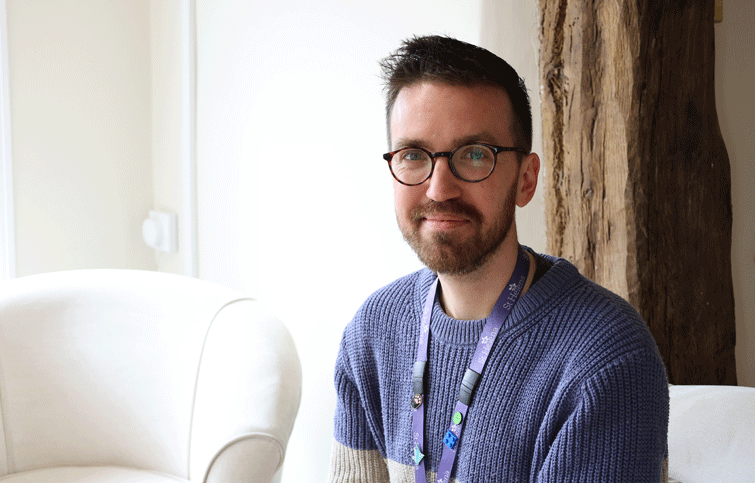Make a difference
People like you help us every day through regular donations
Read stories DonateCompassion is the number one fundamental thing I can bring to a conversation about the end of life. There are times when, before visiting a patient, I have to take a moment to shake off whatever has come before, slow my breathing down, and centre myself, so that I can get in touch with my compassion. Compassion is another word for empathy. Both come from the Greek word ‘pathos’, which means to feel, and they both point to ‘feeling with’ someone.
Brene Brown uses the illustration of sitting with someone in the dark. I sometimes feel tempted to ‘switch the lights on’ with my words: trying to find silver linings, offering comforting words, or pretending that things aren’t as bad as they seem. But I have learned that it’s much more helpful to acknowledge the hardness (“that sounds really tough”), to normalise it (“it’s ok to feel this way”), and even to allow myself to feel it.
Something which I have learned is that respecting another person’s feelings also means recognising that they might not want to talk about the things I want them to talk about. My timing might not be their timing. My needs might not be the same as their needs.
At the Hospice, we talk a lot about being ‘patient-led’, which means recognising that nobody knows more about a person’s needs than the person. So, I try to ask the person I’m talking to what they’d like to talk about. I ask questions which allow them to lead the conversation: “What’s most important to you right now? Is there anything you’d like to talk about? How are you feeling about…?”
Sometimes there are things which I think it would be helpful to explore, but I give people permission not to engage if they don’t want to: “We don’t need to talk about this, but have you thought about…?” And if they don’t want to talk about it, I let them know that the offer still stands: “If there comes a time when you want to talk about something, I’m happy to listen”. Practising compassion means having humility, and not trying to control the conversation.
I have learned that boundaries are the tools to help me to be more compassionate. Having good boundaries in place helps me to protect myself, as well as the person I’m talking to. Boundaries are what stops a conversation from becoming all-consuming or overwhelming.
I try to be aware of what my own boundaries are before I start a conversation. Ask yourself: how much time do I have? Are there things which I can’t talk about today?
Having clear boundaries is a way of looking after myself, and honouring my own feelings, but it also helps the people I’m talking to. It helps them to know that this conversation is happening in a safe space, and that I am being honest and real with them. I try to be open with the other person about my boundaries:
This also gives the other person permission to say the same to me!
In my first week as a hospital chaplain, I cried every day when I got home. I felt anxious, uncomfortable, and at times overwhelmed by the conversations I was having at work. Two years later, there are still days when I feel that way, but they are few and far between. On the whole, I feel quite confident in having difficult conversations.
The key lesson for me was learning it isn’t my job to fix people’s fears. All I need to do is sit with them, so that they’re not facing those fears alone. Once I let go of the pressure I put on myself to make things better, the conversations became simpler. But that takes time. It takes practice to get used to having these kinds of conversations. I’m not suggesting that you need to talk about death every single day, or with everybody you meet (that would be very unboundaried!), but these conversations become less scary the more you have them.
Conversations about death and dying can be heavy, and hard. But they can also be liberating and joyful. They bring me peace and comfort. I don’t do my job because I am a martyr who wants a hard life. I do it because I love it. Opening my world to these kinds of conversations has allowed me to connect with people who have inspired me, challenged me, and reminded me of what’s important in life. There are lots of laughs to be had, as well as tears. Being in a job that allows me to talk about this stuff is a gift that I’m grateful for.
Exploring this stuff might be scary at times, and it might feel uncomfortable, but the rewards are huge; so, I’d encourage you to join the conversation! The good news is that you don’t need to start this alone. While it still feels new and uncomfortable, we are here to support you. Come along to one of Compassionate Conversations workshops. Follow us on social media @StHelenaHospice. Come volunteer with us! There are lots of ways for you to get involved, which will give you opportunities to have conversations about death and dying in a safe, supportive environment.
Learn more about our Dying Matters campaign and download our conversation starter pack.

When you make a donation to St Helena Hospice, we are charged transactional fees by other companies, including fees for processing payments made to us, looking up addresses and validating bank account details.
We are very grateful to our donors who offer to offset some of these fees with a minor addition to their total amount. This is however completely optional and we are very grateful for your support whether or not you choose to contribute to processing fees.
CloseWe are able to claim an extra 25p on every £1 on your donation amount for no extra cost to you, as long as you are a UK tax payer; have paid enough income tax or capital gains tax in that tax year; and are donating your own money. If you pay less income tax and/or capital gains tax than the amount of Gift Aid claimed on all of your donations in that tax year it is your responsibility to pay any difference. For more information about Gift Aid, please visit https://www.gov.uk/donating-to-charity/gift-aid
